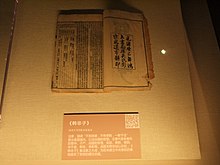 A late 19th century edition of the Hanfeizi by Hongwen Book Company | |
| Author | Han Fei |
|---|---|
| Original title | 韩非子 |
| Language | Chinese |
| Genre | Chinese classics |
Publication date | 3rd century BCE |
| Publication place | China |
| Han Feizi | |||||||||||||||||||||||||||||||||||||
|---|---|---|---|---|---|---|---|---|---|---|---|---|---|---|---|---|---|---|---|---|---|---|---|---|---|---|---|---|---|---|---|---|---|---|---|---|---|
 | |||||||||||||||||||||||||||||||||||||
| Traditional Chinese | 韓非子 | ||||||||||||||||||||||||||||||||||||
| Simplified Chinese | 韩非子 | ||||||||||||||||||||||||||||||||||||
| Literal meaning | "[The Writings of] Master Han Fei" | ||||||||||||||||||||||||||||||||||||
| |||||||||||||||||||||||||||||||||||||
| Part of a series on |
| Chinese legalism |
|---|
 |
The Han Feizi (simplified Chinese: 韩非子; traditional Chinese: 韓非子; pinyin: Hánfēizi; lit. 'Book of Master Han Fei') is an ancient Chinese text attributed to the Legalist political philosopher Han Fei.[1] It comprises a selection of essays in the Legalist tradition, elucidating theories of state power, and synthesizing the methodologies of his predecessors.[2] Its 55 chapters, most of which date to the Warring States period mid-3rd century BCE, are the only such text to survive fully intact.[3][2] The Han Feizi is believed to contain the first commentaries on the Dao De Jing.[4][5] Temporarily coming to overt power as an ideology with the ascension of the Qin dynasty,[6]: 82 the First Emperor of Qin and succeeding emperors often followed the template set by Han Fei.[7]
Often considered the "culminating" or "greatest" Legalist texts, Han Fei was dubbed by A. C. Graham amongst as the "great synthesizer" of 'Legalism'".[8][9] Sun Tzu's The Art of War incorporates both a Daoist philosophy of inaction and impartiality, and a 'Legalist' system of punishment and rewards, recalling Han Fei's use of the concepts of power and technique.[10]
Among the most important philosophical classics in ancient China,[11] it touches on administration, diplomacy, war and economics,[12] and is also valuable for its abundance of anecdotes about pre-Qin China. Though differing considerably in style, the coherency of the essays lend themselves to the possibility that much was written by Han Fei himself, and are generally considered more philosophically engaging than the Book of Lord Shang.[13] Zhuge Liang is said to have attached great importance to the Han Feizi, as well as to Han Fei's predecessor Shen Buhai.[14]
- ^ Encyclopedia of World Biography[full citation needed]
- ^ a b Lévi (1993), p. 115.
- ^ Pines, Yuri, "Legalism in Chinese Philosophy", The Stanford Encyclopedia of Philosophy (Winter 2014 Edition), Edward N. Zalta (ed.),
- (Goldin 2013)
- ^ Pines, Yuri (2014), Zalta, Edward N.; Nodelman, Uri (eds.), "Legalism in Chinese Philosophy", The Stanford Encyclopedia of Philosophy (Winter 2014 ed.), Metaphysics Research Lab, Stanford University, retrieved 2023-08-29
- ^ Lu, Xing (1998). Rhetoric in Ancient China, Fifth to Third Century, B.C.E.: A Comparison with Classical Greek Rhetoric. Univ of South Carolina Press. ISBN 978-1-57003-216-5.
- ^ Bishop, Donald H. (September 27, 1995). Chinese Thought: An Introduction. Motilal Banarsidass Publ. ISBN 9788120811393.
- ^ Kenneth Winston p. 315. Singapore Journal of Legal Studies [2005] 313–347. The Internal Morality of Chinese Legalism. http://law.nus.edu.sg/sjls/articles/SJLS-2005-313.pdf
- ^ Yu-lan Fung 1948. p. 157. A Short History of Chinese Philosophy. https://books.google.com/books?id=HZU0YKnpTH0C&pg=PA157
- Eno, Robert (2010), Legalism and Huang-Lao Thought (PDF), Indiana University, Early Chinese Thought Course Readings
- Hu Shi 1930: 480–48, also quoted Yuri Pines 2013. Birth of an Empire
- ^ Goldin (2011), p. 15.
- ^ Chen, Chao Chuan and Yueh-Ting Lee 2008 p. 12. Leadership and Management in China
- ^ Pang-White, Ann A. (2016). The Bloomsbury Research Handbook of Chinese Philosophy and Gender. Bloomsbury Publishing. ISBN 978-1-4725-6986-8.[page needed]
- ^ Gernet, Jacques (1996). A History of Chinese Civilization. Cambridge University Press. p. 90. ISBN 978-0-521-49781-7.
- ^ Cite error: The named reference
ReferenceBwas invoked but never defined (see the help page). - ^ Zhuge Liang ref Paul R. Goldin 2013. Dao Companion to the Han Feizi p.271. https://books.google.com/books?id=l25hjMyCfnEC&dq=%22han+fei%22+%22zhuge+liang%22&pg=PA271 Guo, Baogang (2008). China in Search of a Harmonious Society. p38. https://books.google.com/books?id=UkoStC-S-AMC&pg=PA38 Pines, Yuri (10 December 2014). "Legalism in Chinese Philosophy". Epilogue: Legalism in Chinese History. https://plato.stanford.edu/archives/win2014/entries/chinese-legalism/ Current Shen Buhai reference is less strong, but Han Feizi is rooted in Shen's administrative doctrine regardless; Shen does not imply Han Fei, but Han Fei implies Shen